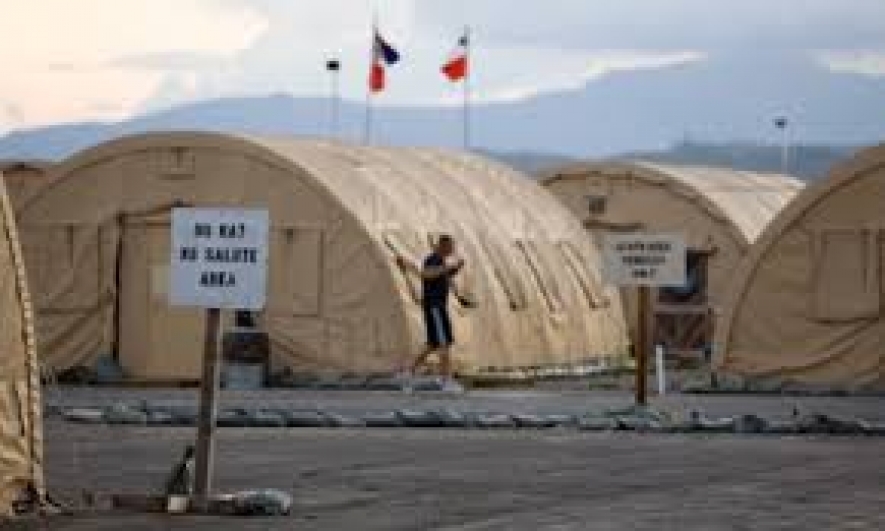The US came under sharp criticism at the UN human rights committee in Geneva on Thursday for a long list of human rights abuses that included everything from detention without charge at Guantánamo, drone strikes and NSA surveillance, to the death penalty, rampant gun violence and endemic racial inequality.
At the start of a two-day grilling of the US delegation, the committee’s 18 experts made clear their deep concerns about the US record across a raft of human rights issues. Many related to faultlines as old as America itself, such as guns and race.
Other issues were relative newcomers. The experts raised questions about the National Security Agency’s surveillance of digital communications in the wake of Edward Snowden’s revelations. It also intervened in this week’s dispute between the CIA and US senators by calling for declassification and release of the 6,300-page report into the Bush administration’s use of torture techniques and rendition that lay behind the current CIA-Senate dispute.
The committee is charged with upholding the International Covenant on Civil and Political Rights (ICCPR), a UN treaty that the US ratified in 1992. The current exercise, repeated every five years, is a purely voluntarily review, and the US will face no penalties should it choose to ignore the committee’s recommendations, which will appear in a final report in a few weeks’ time.
But the US is clearly sensitive to suggestions that it fails to live up to the human rights obligations enshrined in the convention – as signalled by the large size of its delegation to Geneva this week. And as an act of public shaming, Thursday’s encounter was frequently uncomfortable for the US.
The US came under sustained criticism for its global counter-terrorism tactics, including the use of unmanned drones to kill al-Qaida suspects, and its transfer of detainees to third countries that might practice torture, such as Algeria. Committee members also highlighted the Obama administration’s failure to prosecute any of the officials responsible for permitting waterboarding and other “enhanced interrogation” techniques under the previous administration.
Walter Kälin, a Swiss international human rights lawyer who sits on the committee, attacked the US government’s refusal to recognise the convention’s mandate over its actions beyond its own borders. The US has asserted since 1995 that the ICCPR does not apply to US actions beyond its borders - and has used that “extra-territoriality” claim to justify its actions in Guantánamo and in conflict zones.
“This world is an unsafe place,” Kälin said. “Will it not become even more dangerous if any state would be willing to claim that international law does not prevent them from committing human rights violations abroad?”
Kälin went on to express astonishment at some of America’s more extreme domestic habits. He pointed to the release this week in Louisiana of Glenn Ford, the 144th person on death row in the US to be exonerated since 1973, saying: “One hundred and forty-four cases of people wrongfully convicted to death is a staggering number.”
Pointing out the disproportional representation of African Americans on death rows, he added: “Discrimination is bad, but it is absolutely unacceptable when it leads to death.”
On guns, Kälin pointed to another “staggering figure” – that there are 470,000 crimes committed with firearms each year, including about 11,000 homicides. “We appreciate the position taken by President Obama on these issues. Nevertheless, much more needs to be done to curb gun violence.”
Among the other issues that came under the committee’s withering gaze were: the proliferation of stand-your-ground gun laws
· enduring racial disparities in the justice system, including large numbers of black prisoners serving longer sentences than whites;
· mistreatment of mentally-ill and juvenile prisoners;
· segregation in schools;
· high levels of homelessness and criminalization of homeless people;
· racial profiling by police, including the mass surveillance of Muslim communities by the New York police department.
The head of the US delegation, Mary McLeod, a senior official in the State Department, insisted that the country was “continually striving to improve”. She said: “While we are certainly not perfect, our network of federal, state and local institutions provide checks on government … Since the founding of our country, in every generation there have been Americans who sought to realize our constitution’s promise of equal opportunity and justice for all.”
She said that Obama was working to reduce the number of detainees in Guantánamo, insisted that drone strikes were conducted “in compliance with international law”, and argued that the NSA was under “substantial oversight” by other parts of government. The administration was taking measures to reduce disparities in racial sentencing and profiling, and the death penalty was steadily declining in the 32 states that still practiced it, McLeod noted. (The Guardian)
US criticised by UN for human rights failings on NSA, guns and drones
March 15, 2014
Geneva panel share deep concerns over US record on host of different subjects, including racial inequality and Guantánamo




















